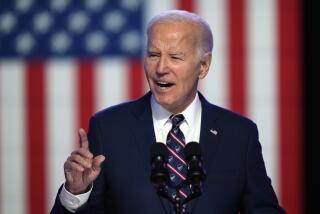Alternative Candidates
- Share via
As the reform party moves toward naming its presidential nominee, here’s a look at how this century’s major third-party and independent candidates fared and what they stood for.
1912: Theodore Roosevelt, Progressive
Rebuffed in his bid for that year’s Republican nomination, the former president pushed for several reforms and programs later adopted, including direct election of U.S. senators, women’s suffrage and creation of a social insurance system.
Popular vote: 27%
Electoral vote: 88%
****
1924: Robert M. La Follette, Progressive
Heading a party that decried “the control fo government and industry by private monopoly,” the Wisconsin senator endorsed government ownership of railroads, rigid federal control of natural resources and a variety of political reforms.
Popular vote: 17%
Electoral vote: 13%
****
1948 Strom Thurmond, States’ Rights
The then-governor of South Carolina, one of a group of Southern Democrats who bolted the party when it embraced a civil rights plant, ran on a platform favoring “the segregation of the races and the racial integrity of each race.”
Popular vote: 2%
Electoral vote: 39%
****
1948: Henry A. Wallace, Progressive
Formed by the former vice president dumped from the Democratic ticket in 1944 after one term, the party advocated worldwide disarmament, extending the vote to 18 year-olds, formation of a “Department of Culture” and a food stamp program.
Popular vote: 2%
Electoral vote: 0%
****
1968: George C. Wallace, American Independent
The then-Alabama governor proclaiming there wasn’t “a dime’s worth of difference” between the major parties, stressed strict adherence to “state’s rights,” then the battle cry of those opposing civil rights legislation.
Popular vote: 14%
Electoral vote: 46%
****
1980: John B. Anderson, Independent
The then-U.S. House member from Illinois proposed a 50-cent-per-gallon gasoline tax to discourage consumption and use of alcohol and tobacco taxes to build mass transit system.
Popular vote: 7%
Electoral vote: 0%
****
1992: Ross Perot, Independent
The Texas billionaire focused almost exclusively on his call for reducing the federal budget; his specific proposals included cutting Medicare spending by $83 billion over five years and raising the top income tax bracket tp 33% from 31%.
Popular vote: 19%
Electoral vote: 0%
More to Read
Get the L.A. Times Politics newsletter
Deeply reported insights into legislation, politics and policy from Sacramento, Washington and beyond. In your inbox twice per week.
You may occasionally receive promotional content from the Los Angeles Times.










